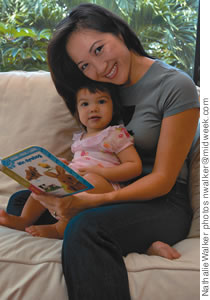How to make your baby smarter
Do Baby Einstein videos and the myriad of other trendy learning tools for babies really work to make babies smarter? We asked the experts. Interaction, it turns out, is the No. 1 key to making your baby smarter, whether it’s with someone or something. Dr. Steven Choy is a clinical psychologist who has been working with young children for 25 years, and his research has found that movement and music stimulate cognitive development.

|
opment: 1-3 months: a mobile, black and white pictures; 4-6 months: soft balls, keys, toys with some lights or sound; 7-8 months: textured toys 9-12 months: Let them explore without restriction - opening drawers, banging on pots, etc.
Other things that boost brain development and parent/child bonding, and require no money:
* breast-feeding - studies have shown that it improves a child’s IQ
* teaching simple words or to count in another language (vocabulary development)
* sign language (communication)
* build an obstacle course in your living room with pillows and other objects (coordination and problem solving)
* nature walks - pointing and explaining what things are (vocabulary/sensory development)
* touch and feel - explore a selection of household items and compare soft/hard/fuzzy/cool (sensory development)
* let them play with food (exploration of senses)
* read books (vocabulary)
* listen, sing and dance to music (sensory)
“Read to them all the time and keep it fun,” Bentley advises. “Even if they can’t read, acquaint young ones with the structure of books. Make them aware of language structure. Babies have to hear it to understand language. When you read to your child, you’re also interacting with them, and that involves all the senses in baby’s brain.”
Most children learn to read at age 5 or 6. A child is considered an early reader if they start reading at age 3 or 4. But don’t place a lot of emphasis on reading as the only indicator of intelligence. Choy says, “Learning to read early in and of itself is not necessarily a sign of intelligence.”
If it’s toys you want, pediatricians recommend buying toys that let your child’s imagination blossom. “I like toys with texture, sounds and colors. It engages their senses,” says Nakano.
Bentley has a similar recommendation. “There’s a baby gym where you can lie the baby down and let him look up at all kinds of shapes. That’s good for teaching cause and effect. He can figure out ‘If I kick this, it moves.’ Babies will try that over and over. This movement actually builds their neurological connections. Buy a rattle, building blocks and a baby gym.”
Kids’ classes and gyms like MyGym, Gymboree, Island Monkeez and Wee Play also get high marks from experts. It’s not a material product, but if you want to invest your money in something educational, you might consider buying class time instead of a toy.
“This is ideal because it involves physical and mental stimulation, and it makes you interact with the child,” says Choy. “Studies show children need movement to build neurological connections in the brain. Movement, drama and music help cognitive development.”
Bentley agrees. “If there is a structured playtime where the teacher sets up a game and explains what skills it is working on, that’s great. For instance, if they set up a tunnel and tell the parents, this teaches spatial awareness. I also think it’s good because you can talk with other parents and become aware of other parenting tips.”
In conclusion, you could spend a lot of money on toys and products to boost your child’s intelligence. You also could replicate it all with a cardboard box and a wooden spoon. It doesn’t have to cost a lot to raise a smart baby. What it takes is time: a commitment to interact with your child and provide an environment that stimulates their creativity.
Page 2 of 2 pages for this story < 1 2
E-mail this story | Print this page | Comments (0) | Archive | RSS
Most Recent Comment(s):








